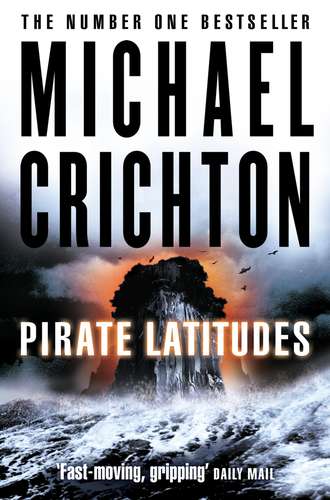
Полная версия
Pirate Latitudes
This was Captain Charles Hunter’s normal toilet, performed each evening when he arose at sunset. It took only a few minutes, for Hunter was not a fastidious man. Nor, he reflected, was he much of a Puritan; he looked again at the girl in the bed, then closed the door behind her and went down the narrow creaking wood stairs to the main room of Mrs. Denby’s Inn.
The main room was a broad, low-ceilinged space with a dirt floor and several heavy wooden tables in long rows. Hunter paused. As Mrs. Denby had said, Levasseur was there, sitting in a corner, hunched over a tankard of grog.
Hunter crossed to the door.
“Hunter!” Levasseur croaked, in a thick drunken voice.
Hunter turned, showing apparent surprise. “Why, Levasseur. I didn’t see you.”
“Hunter, you son of an English mongrel bitch.”
“Levasseur,” he replied, stepping out of the light, “you son of a French farmer and his favorite sheep, what brings you here?”
Levasseur stood behind the table. He had picked a dark spot; Hunter could not see him well. But the two men were separated by a distance of perhaps thirty feet—too far for a pistol shot.
“Hunter, I want my money.”
“I owe you no money,” Hunter said. And, in truth, he did not. Among the privateers of Port Royal, debts were paid fully and promptly. There was no more damaging reputation a man could have than one who failed to pay his debts, or to divide spoils equally. On a privateering raid, any man who tried to conceal a part of the general booty was always put to death. Hunter himself had shot more than one thieving seaman through the heart and kicked the corpse overboard without a second thought.
“You cheated me at cards,” Levasseur said.
“You were too drunk to know the difference.”
“You cheated me. You took fifty pounds. I want it back.”
Hunter looked around the room. There were no witnesses, which was unfortunate. He did not want to kill Levasseur without witnesses. He had too many enemies. “How did I cheat you at cards?” he asked. As he spoke, he moved slightly closer to Levasseur.
“How? Who cares a damn for how? God’s blood, you cheated me.” Levasseur raised the tankard to his lips.
Hunter chose that moment to lunge. He pushed his palm flat against the upturned tankard, ramming it back against Levasseur’s face, which thudded against the back wall. Levasseur gurgled and collapsed, blood dripping from his mouth. Hunter grabbed the tankard and crashed it down on Levasseur’s skull. The Frenchman lay unconscious.
Hunter shook his hand free of the wine on his fingers, turned, and walked out of Mrs. Denby’s Inn. He stepped ankle-deep into the mud of the street, but paid no attention. He was thinking of Levasseur’s drunkenness. It was sloppy of him to be so drunk while waiting for someone.
It was time for another raid, Hunter thought. They were all getting soft. He himself had spent one night too many in his cups, or with the women of the port. They should go to sea again.
Hunter walked through the mud, smiling and waving to the whores who yelled to him from high windows, and made his way to the Governor’s Mansion.
“ALL HAVE REMARKED upon the comet, seen over London on the eve of the plague,” said Captain Morton, sipping his wine. “There was a comet before the plague of ’56, as well.”
“So there was,” Almont said. “And what of that? There was a comet in ’59, and no plague that I recall.”
“An outbreak of the pox in Ireland,” said Mr. Hacklett, “in that very year.”
“There is always an outbreak of the pox in Ireland,” Almont said. “In every year.”
Hunter said nothing. Indeed, he had said little during the dinner, which he found as dreary as any he had ever attended at the Governor’s Mansion. For a time, he had been intrigued by the new faces—Morton, the captain of the Godspeed, and Hacklett, the new secretary, a silly pinch-faced prig of a man. And Mrs. Hacklett, who looked to have French blood in her slender darkness, and a certain lascivious animal quality.
For Hunter, the most interesting moment in the evening had been the arrival of a new serving girl, a delicious pale blond child who came and went from time to time. He kept trying to catch her eye. Hacklett noticed, and gave Hunter a disapproving stare. It was not the first disapproving stare he had given Hunter that evening.
When the girl came round to refill the glasses, Hacklett said, “Does your taste run to servants, Mr. Hunter?”
“When they are pretty,” Hunter said casually. “And how does your taste run?”
“The mutton is excellent,” Hacklett said, coloring deeply, staring at his plate.
With a grunt, Almont turned the conversation to the Atlantic passage his guests had just made. There was a description of a tropical storm, told in exciting and overwrought detail by Morton, who acted as if he were the first person in human history to face a little white water. Hacklett added a few frightening touches, and Mrs. Hacklett allowed that she had been quite ill.
Hunter grew increasingly bored. He drained his wineglass.
“Well then,” Morton continued, “after two days of this most dreadful storm, the third day dawned perfectly clear, a magnificent morning. One could see for miles and the wind was fair from the north. But we did not know our position, having been blown for forty-eight hours. We sighted land to port, and made for it.”
A mistake, Hunter thought. Obviously Morton was grossly inexperienced. In the Spanish waters, an English vessel never made for land without knowing exactly whose land it was. The odds were, the Don held it.
“We came round the island, and to our astonishment we saw a warship anchored in the harbor. Small island, but there it was, a Spanish warship and no doubt of it. We felt certain it would give chase.”
“And what happened?” Hunter asked, not very interested.
“It remained in the harbor,” Morton said, and laughed. “I should like to have a more exciting conclusion to the tale, but the truth is it did not come after us. The warship remained in the harbor.”
“The Don saw you, of course?” Hunter said, growing more interested.
“Well, they must have done. We were under full canvas.”
“How close by were you?”
“No more than two or three miles offshore. The island wasn’t on our charts, you know. I suppose it was too small to be charted. It had a single harbor, with a fortress to one side. I must say we all felt we had a narrow escape.”
Hunter turned slowly to look at Almont. Almont was staring at him, with a slight smile.
“Does the episode amuse you, Captain Hunter?”
Hunter turned back to Morton. “You say there was a fortress by the harbor?”
“Indeed, a rather imposing fortress, it seemed.”
“On the north or south shore of the harbor?”
“Let me recollect—north shore. Why?”
“How long ago did you see this ship?” Hunter asked.
“Three or four days past. Make it three days. As soon as we had our bearings, we ran straight for Port Royal.”
Hunter drummed his fingers on the table. He frowned at his empty wineglass. There was a short silence.
Almont cleared his throat. “Captain Hunter, you seem preoccupied by this story.”
“Intrigued,” Hunter said. “I am sure the governor is equally intrigued.”
“I believe,” Almont said, “that it is fair to say the interests of the Crown have been aroused.”
Hacklett sat stiffly in his chair. “Sir James,” he said, “would you edify the rest of us as to the import of all this?”
“Just a moment,” Almont said, with an impatient wave of the hand. He was looking fixedly at Hunter. “What terms do you make?”
“Equal division, first,” Hunter said.
“My dear Hunter, equal division is most unattractive to the Crown.”
“My dear Governor, anything less would make the expedition most unattractive to the seamen.”
Almont smiled. “You recognize, of course, that the prize is enormous.”
“Indeed. I also recognize that the island is impregnable. You sent Edmunds with three hundred men against it last year. Only one returned.”
“You yourself have expressed the opinion that Edmunds was not a resourceful man.”
“But Cazalla is certainly resourceful.”
“Indeed. And yet it seems to me that Cazalla is a man you should like to meet.”
“Not unless there was an equal division.”
“But,” Sir James said, smiling in an easy way, “if you expect the Crown to outfit the expedition, that cost must be returned before any division. Fair?”
“Here, now,” Hacklett said. “Sir James, are you bargaining with this man?”
“Not at all. I am coming to a gentleman’s agreement with him.”
“For what purpose?”
“For the purpose of arranging a privateering expedition on the Spanish outpost at Matanceros.”
“Matanceros?” Morton said.
“That is the name of the island you passed, Captain Morton. Punta Matanceros. The Don built a fortress there two years ago, under the command of an unsavory gentleman named Cazalla. Perhaps you’ve heard of him. No? Well, he has a considerable reputation in the Indies. He is said to find the screams of his dying victims restful and relaxing.” Almont looked at the faces of his dinner guests. Mrs. Hacklett was quite pale. “Cazalla commands the fortress of Matanceros, built for the sole purpose of being the farthest eastward outpost of Spanish dominion along the homeward route of the Treasure Fleet.”
There was a long silence. The guests looked uneasy.
“I see you do not comprehend the economics of this region,” Almont said. “Each year, Philip sends a fleet of treasure galleons here from Cádiz. They cross to the Spanish Main, sighting first land to the south, off the coast of New Spain. There the fleet disperses, traveling to various ports—Cartagena, Vera Cruz, Portobello—to collect treasure. The fleet regroups in Havana, then travels east back to Spain. The purpose of traveling together is protection against privateering raids. Am I clear?”
They all nodded.
“Now,” Almont continued, “the Armada sails in late summer, which is the onset of the hurricane season. From time to time, it has happened that ships have been separated from the convoy early in the voyage. The Don wanted a strong harbor to protect such ships. They built Matanceros for this reason alone.”
“Surely that is not sufficient reason,” Hacklett said. “I cannot imagine…”
“It is ample reason,” Almont said abruptly. “Now then. As luck would have it, two treasure naos were lost in a storm some weeks ago. We know because they were sighted by a privateer vessel, which attacked them unsuccessfully. They were last seen beating southward, making for Matanceros. One was badly damaged. What you, Captain Morton, called a Spanish warship was obviously one of these treasure galleons. If it had been a genuine warship, it would surely have given chase at a two-mile range, and captured you, and even now you would be screaming your lungs out for Cazalla’s amusement. The ship did not give chase because it dared not leave the protection of the harbor.”
“How long will it stay there?” Morton asked.
“It may leave at any time. Or it may wait until the next fleet departs, next year. Or it may wait for a Spanish warship to arrive and escort it home.”
“Can it be captured?” Morton asked.
“One would like to think so. In aggregate, the treasure ship probably contains a fortune worth five hundred thousand pounds.”
There was a stunned silence around the table.
“I felt,” Almont said with amusement, “that this information would interest Captain Hunter.”
“You mean this man is a common privateer?” demanded Hacklett.
“Not common in the least,” Almont said, chuckling. “Captain Hunter?”
“Not common, I would say.”
“But this levity is outrageous!”
“You forget your manners,” Almont said. “Captain Hunter is the second son of Major Edward Hunter, of the Massachusetts Bay Colony. He was, in fact, born in the New World and educated at that institution, what is it called—”
“Harvard,” Hunter said.
“Umm, yes, Harvard. Captain Hunter has been among us for four years, and as a privateer, he has some standing in our community. Is that a fair summation, Captain Hunter?”
“Only fair,” Hunter said, grinning.
“The man is a rogue,” Hacklett said, but his wife was looking at Hunter with new interest. “A common rogue.”
“You should mind your tongue,” Almont said calmly. “Dueling is illegal on this island, yet it happens with monotonous regularity. I regret there is little I can do to stop the practice.”
“I’ve heard of this man,” Hacklett said, still more agitated. “He is not the son of Major Edward Hunter at all, at least not the legitimate son.”
Hunter scratched his beard. “Is that so?”
“I have heard it,” Hacklett said. “Further, I have heard he is a murderer, scoundrel, whoremonger, and pirate.”
At the word “pirate,” Hunter’s arm flicked out across the table with extraordinary speed. It fastened in Hacklett’s hair and plunged his face into his half-eaten mutton. Hunter held him there for a long moment.
“Dear me,” Almont said. “I warned him about that earlier. You see, Mr. Hacklett, privateering is an honorable occupation. Pirates, on the other hand, are outlaws. Do you seriously suggest that Captain Hunter is an outlaw?”
Hacklett made a muffled sound, his face in his food.
“I didn’t hear you, Mr. Hacklett,” Almont said.
“I said, ‘No,’” Hacklett said.
“Then don’t you think it appropriate as a gentleman to apologize to Captain Hunter?”
“I apologize, Captain Hunter. I meant you no disrespect.”
Hunter released the man’s head. Hacklett sat back, and wiped the gravy from his face with his napkin.
“There now,” Almont said. “A moment of unpleasantness has been averted. Shall we take dessert?”
Hunter looked around the table. Hacklett was still wiping his face. Morton was staring at him with open astonishment. And Mrs. Hacklett was looking at Hunter and when she caught his eye, she licked her lip.
AFTER DINNER, HUNTER and Almont sat alone in the library of the mansion, drinking brandy. Hunter commiserated with the governor over the appointment of the new secretary.
“He makes my life no simpler,” Almont agreed, “and I fear it may be the same for you.”
“You think he’ll send unfavorable dispatches to London?”
“I think he may try.”
“The king must surely know what transpires in his Colony.”
“That is a matter of opinion,” Almont said, with an airy gesture. “One thing is certain; the continued support of privateers will be assured if it repays the king handsomely.”
“No less than an equal division,” Hunter said quickly. “I tell you, it cannot be otherwise.”
“But if the Crown outfits your ships, arms your seamen…”
“No,” Hunter said. “That will not be necessary.”
“Not necessary? My dear Hunter, you know Matanceros. A full Spanish garrison is stationed there.”
Hunter shook his head. “A frontal assault will never succeed. We know that from the Edmunds expedition.”
“But what alternative is there? The fortress at Matanceros commands the entrance to the harbor. You cannot escape with the treasure ship without first capturing the fortress.”
“Indeed.”
“Well then?”
“I propose a small raid from the landward side of the fortress.”
“Against a full garrison? At least three hundred troops? You cannot succeed.”
“On the contrary,” Hunter said. “Unless we succeed, Cazalla will turn his guns on the treasure galleon, and sink it at anchor in the harbor.”
“I hadn’t thought of that,” Almont said. He sipped his brandy. “Tell me more of your plan.”
CHAPTER 7
LATER, AS HE was leaving the Governor’s Mansion, Mrs. Hacklett appeared in the hall, and came over to him. “Captain Hunter.”
“Yes, Mrs. Hacklett.”
“I want to apologize for the inexcusable conduct of my husband.”
“No apology is necessary.”
“On the contrary, Captain. I think it entirely necessary. He behaved like a boor and an oaf.”
“Madam, your husband apologized as a gentleman on his own behalf, and the matter is concluded.” He nodded to her. “Good evening.”
“Captain Hunter.”
He stopped at the door and turned. “Yes, Madam?”
“You are a most attractive man, Captain.”
“Madam, you are very gracious. I look forward to our next meeting.”
“I as well, Captain.”
Hunter walked away thinking that Mr. Hacklett had best look to his wife. Hunter had seen it happen before—a well-bred woman, reared in a rural gentry setting in England, who found some excitement in the Court—as no doubt Mrs. Hacklett had—if her husband looked away—as no doubt Mr. Hacklett had. Nevertheless, on finding herself in the Indies, far from home, far from the restraints of class and custom…Hunter had seen it before.
He walked down the cobbled street away from the mansion. He passed the cookhouse, still brightly lit, the servants working inside. All houses in Port Royal had separate cookhouses, a necessity in the hot climate. Through the open windows, he saw the figure of the blond girl who had served dinner. He waved to her.
She waved back and turned away to her work.
THEY WERE BAITING a bear outside Mrs. Denby’s Inn. Hunter watched the children pelt the helpless animal with rocks; they laughed and giggled and shouted as the bear growled and tugged at its stout chain. A couple of whores beat the bear with sticks. Hunter walked past, and entered the inn.
Trencher was there, sitting in a corner, drinking with his one good arm. Hunter called to him, and drew him aside.
“What is it, Captain?” Trencher asked eagerly.
“I want you to find some mates for me.”
“Say who they shall be, Captain.”
“Lazue, Mr. Enders, Sanson. And the Moor.”
Trencher smiled. “You want them here?”
“No. Find where they are, and I’ll seek them out. Now, where is Whisper?”
“In the Blue Goat,” Trencher said. “The back room.”
“And Black Eye is in Farrow Street?”
“I think so. You want the Jew, too, do you?”
“I am trusting your tongue,” Hunter said. “Keep it still now.”
“Will you take me with you, Captain?”
“If you do as you are told.”
“I swear by God’s wounds, Captain.”
“Then look sharp,” Hunter said, and left the inn, returning to the muddy street. The night air was warm and still, as it had been during the day. He heard the soft strumming of a guitar, and, somewhere, drunken laughter, and a single gunshot. He set off down Ridge Street for the Blue Goat.
The town of Port Royal was divided into rough sections, oriented around the port itself. Nearest the dockside were located the taverns and brothels and gaming houses. Farther back, away from the brawling activity of the waterfront, the streets were quieter. Here the grocers and backers, the furniture workers and ships’ chandlers, the blacksmiths and goldsmiths could be found. Still farther back, on the south side of the bay, were the handful of respectable inns and private homes. The Blue Goat was a respectable inn.
Hunter entered, nodding to the gentlemen drinking at the tables. He recognized the best landsman’s doctor, Mr. Perkins; one of the councilmen, Mr. Pickering; the bailiff of the Bridewell gaol; and several other respectable gentlemen.
Ordinarily, a common privateering seaman would not be welcome in the Blue Goat, but Hunter was accepted with good grace. This was a simple recognition of the way the commerce of the Port depended upon a steady stream of successful privateering raids. Hunter was a skilled and daring captain, and thus an important member of the community. In the previous year, his three forays had returned more than two hundred thousand pistoles and doubloons to Port Royal. Much of this money found its way to the pockets of these gentlemen, and they greeted him accordingly.
Mistress Wickham, who managed the Blue Goat, was less warm. A widow, she had some years before taken up with Whisper, and she knew, when Hunter arrived, that he had come to see him. She jerked her thumb toward a back room. “In there, Captain.”
“Thank you, Mistress Wickham.”
He crossed directly to the back room, knocked, and opened the door without hearing any answering greeting; he knew there would be none. The room was dark, lit only by a single candle. Hunter blinked to adjust to the light. He heard a rhythmic creaking. Finally, he was able to see Whisper, sitting in a corner, in a rocking chair. Whisper held a primed pistol, aimed at Hunter’s belly.
“A good evening, Whisper.”
The reply was low, a rasping hiss. “A good evening, Captain Hunter. You are alone?”
“I am.”
“Then come in” came the hissing reply. “A touch of kill-devil?” Whisper pointed to a barrel beside him, which served as a table. There were glasses and a small crock of rum.
“With thanks, Whisper.”
Hunter watched as Whisper poured two glasses of dark brown liquid. As his eyes adjusted to the light, he could see his companion better.
Whisper—no one knew his real name—was a large, heavyset man with oversized, pale hands. He had once been a successful privateering captain in his own right. Then he had gone on the Matanceros raid with Edmunds. Whisper was the sole survivor, after Cazalla had captured him, cut his throat, and left him for dead. Somehow Whisper lived, but not without the loss of his voice. This and the large, white arcing scar beneath his chin were obvious proofs of his past.
Since his return to Port Royal, Whisper had hidden in this back room, a strong, vigorous man but one without courage—the steel gone out of him. He was frightened; he was never without a weapon in his hands and another at his side. Now, as he rocked in his chair, Hunter saw the gleam of a cutlass on the floor within easy reach.
“What brings you, Captain? Matanceros?”
Hunter must have looked startled. Whisper broke into laughter. Whisper’s laughter was a horrifying sound, a high-pitched wheezing sizzle, like a steam kettle. He threw his head back to laugh, revealing the white scar plainly.
“I startle you, Captain? You are surprised I know?”
“Whisper,” Hunter said. “Do others know?”
“Some,” Whisper hissed. “Or they suspect. But they do not understand. I heard the story of Morton’s voyage.”
“Ah.”
“You are going, Captain?”
“Tell me about Matanceros, Whisper.”
“You wish a map?”
“Yes.”
“Fifteen shillings?”
“Done,” Hunter said. He knew he would pay Whisper twenty, to ensure his friendship and his silence to any later visitors. And for his part, Whisper would know the obligation conferred by the extra five shillings. And he would know that Hunter would kill him if he spoke to anyone else about Matanceros.
Whisper produced a scrap of oilcloth and a bit of charcoal. Placing the oilcloth on his knee, he sketched rapidly.
“The island of Matanceros, it means slaughter in the Donnish tongue,” he whispered. “It has the shape of a U, so. The mouth of the harbor faces to the east, to the ocean. This point”—he tapped the lefthand side of the U—“is Punta Matanceros. That is where Cazalla has built the fortress. It is low land here. The fortress is no more than fifty paces above the level of the water.”
Hunter nodded, and waited while Whisper gurgled a sip of killdevil.
“The fortress is eight-sided. The walls are stone, thirty feet high. Inside there is a Spanish militia garrison.”
“Of what strength?”
“Some say two hundred. Some say three hundred. I have even heard four hundred but do not believe it.”
Hunter nodded. He should count on three hundred troops. “And the guns?”
“On two sides of the fortress only,” Whisper rasped. “One battery to the ocean, due east. One battery across the mouth of the harbor, due south.”
“What guns are they?”





